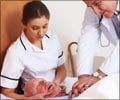- Coping with Loss and Grief During COVID-19 - (https://www.cedars-sinai.org/blog/coping-with-loss-and-grief-during-covid-19.html)
- Grief and Loss - (https://www.cdc.gov/coronavirus/2019-ncov/daily-life-coping/stress-coping/grief-loss.html#loved-one)
- A Time to Grieve: Addressing Bereavement Challenges During the COVID-19 Pandemic - (https://www.psychiatryadvisor.com/home/topics/general-psychiatry/a-time-to-grieve-addressing-bereavement-challenges-during-the-covid-19-pandemic/)
- Coronavirus, bereavement and grief - (https://www.cruse.org.uk/get-help/coronavirus-bereavement-and-grief)
About
Life is indeed precious. The death of a loved one can mean the end of the world for those left behind. Undoubtedly, it is one of life’s toughest journeys. Grieving is important, as it is a natural process of healing.
Bereavement is a word used to denote grief, pain, and sadness following the loss of a loved one. Even though death is an inevitable part of life, the finality and irrevocability of death lend a lethal blow, making it ‘unacceptable’ for those left behind. It is truly one of life’s most stressful periods, with nothing to match the intensity of sorrow experienced during this time.
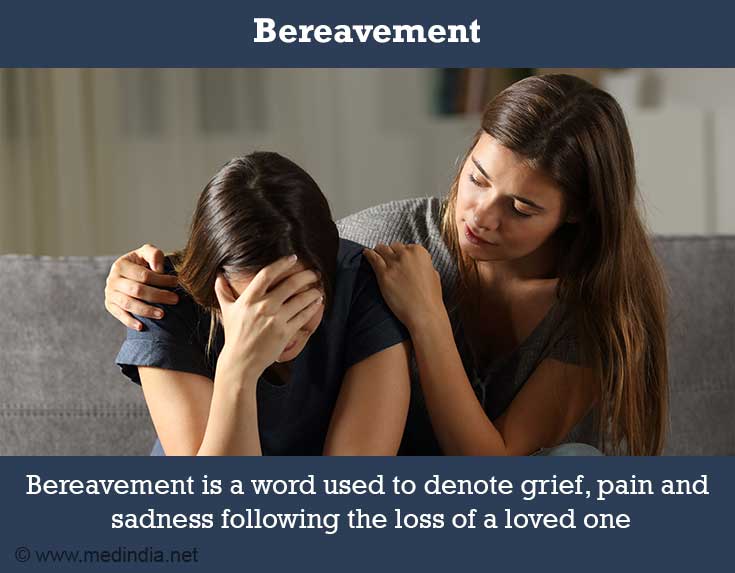
Bereavement is also a time of overwhelming and conflicting emotions. What may begin as shock and disbelief may give way to reflection, realization, and acceptance as time passes by. Physical signs of bereavement may be portrayed as crying, expressing anger, loss of appetite, dip in energy levels, and even sleeplessness. Psychological signs could be depression, feeling lost, being aloof or withdrawn, guilt and even anger.
Support from loved ones, caring, talking ones grief out and even seeking professional help are ways to cope with the bereavement.
"Bereavement is darkness impenetrable to the imagination of the unbereaved." - Iris Murdoch
Process of Grieving
“The sorrow for the dead is the only sorrow from which we refuse to be divorced. Every other wound we seek to heal, every other affliction to forget; but this wound we consider it a duty to keep open; this affliction we cherish and brood over in solitude.” - WASHINGTON IRVING, THE SKETCH BOOK, IN MOFFAT 1992, 270
Grief is nothing but a profound expression of loss. It is normal and even healthy to grieve. Grieving helps in the acceptance of loss, which is crucial to cope and move on with life. On the contrary, if one does not grieve properly, pent up emotions, and refusal to accept reality can negatively impact one’s emotional health.
Though grieving is universal, the manner of grieving varies from person to person. Some take longer to recover following the death of a loved one, while some come out of it faster. Though there are no distinct stages of grieving, it is observed that the process of grieving the death of a loved one could take anywhere from one to two years, before a person can actually accept the loss and move forward.
The initial reaction to the death of a loved one is usually a feeling of numbness or disbelief. This state of disbelief or shock could last anywhere from a couple of hours to days following the death.
In the days following the death, physical and psychological signs of grief may show up. Crying, talking about the dead person, and even seeing glimpses of the person in familiar places are some of the ways in which people express their loss.
Mood swings are very common during the initial days of grieving. Anger, guilt and denial of death could be some of the emotions experienced during this period. Those grieving may also experience sleeplessness, loss of appetite, appear withdrawn and may become weepy all of a sudden. They could also appear disoriented and confused. Some of them experience a deep urge or yearning for their loved one which intensifies their grief.
Recalling conversations, the good times, even the tense moments or conflicts with the one who has passed away, including feelings of regret and remorse are all a natural part of grieving.
Some people withdraw from family and friends. Over time, the sadness and pain get tempered and the bereaved begin to adapt to life without the loved one. Although the sense of loss remains, the bereaved learn to cope and live with it.
Grieving Children
Children also experience the same emotions as adults. It is good for children to grieve and express their feelings instead of bottling it all up. Children are endowed with abundant positivity, which helps them cope much faster than adults and move on in life. Yet, suppose some continue to feel depressed, experience mood swings and portray other visible signs - sleeplessness, lack of interest, loss of appetite - medical advice, and counseling can help children sort out their feelings.
Talking to children offers them comfort and security, while also allaying any fears due to the loss of a loved one. It is important to treat children with patience and care and not criticize them as it might only precipitate their anxiety and insecurity during a testing time.
Factors Influencing Grief
Relationship with the dead person and manner of death can also influence the grieving process. Even if the death was expected as in cases of terminal illnesses where families may have undergone ‘anticipatory grief’ and are supposedly prepared for the loss, facing the reality of death can still be traumatic. The suffering undergone before death also increases the pain and sorrow of the bereaved.
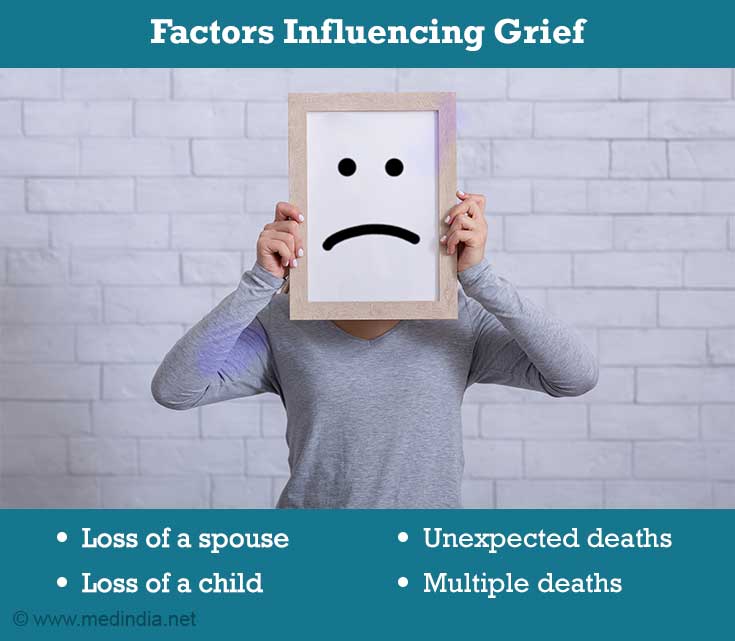
The loss of a spouse can be extremely traumatic. For some, it can be life-changing, especially if the spouse was the sole breadwinner, which can bring both emotional as well as financial stress on the bereaved spouse.
The loss of a child is by far the worst form of grief. It can send parents into a state of deep shock and denial. Grief over the loss of a child is also accompanied by guilt, a sense of injustice and anger, and also wishes of what could have been if the death was averted. Memories of the precious one could haunt ceaselessly, making it one of the toughest bereavements to cope with.
Unexpected deaths due to accidents or suicide, or even a sudden illness can also be very difficult to cope with. The bereaved experience extreme guilt, and may blame themselves for the situation especially in cases of death by suicide where they feel the death could have been prevented. Accepting the loss of a loved one in such cases may take longer.
Multiple deaths within a family can also exacerbate grief making it very tough for those left behind. An acute sense of shock envelops the aggrieved, who could go through stress, trauma, anxiety and depression. Professional help and counseling may be the best way to deal with such trauma.
Ways to Cope With Grief
Expression of grief is sacrosanct to acceptance of the loss, leading to sound emotional health.
Do not be too hard on yourself
In these extremely turbulent times, it is important to allow the experience of all the different emotions that well up in the mind. Hurt, sadness, pain and hopelessness are a natural part of grieving, and should not be blocked.
Acceptance of loss is a time consuming phase and will not happen in a day
Shock, denial, “why me?”, anger, guilt, tearful outbursts are some of the reactions as people come to terms with the death of their loved one. Depression and sadness in the initial days and months following the death is a form of grieving. One may not feel like performing the usual chores. It is important to give oneself ample time and space to sort out feelings in order to regain composure.
Talk your feelings with family and friends
Sharing the pain and talking about it can ease the burden to a great extent. Asking for help in whatever way from close family and friends will enable time to sort out the raging emotions during this period.
Seek professional help
Though it may take one or two years to completely recover from the death of a loved one, the intensity of grief begins to abate during the six months period following the death of the loved one. Yet for some, depression sets in and becomes worse with every passing day. The services of psychiatrists, psychologists and counselors can be sought. Bereavement counseling can be a great blessing to help the bereaved come to terms with the loss.
Join a support group
Support groups are a means to get in touch with people in a similar situation. Communication with those in a similar circumstance helps share the pain and anguish while also opening channels for ways to cope. This can be a great route to healing and moving on with life.
Support groups are especially helpful for those who do not have family or friends to bank on to share their grief. One can also lean on support groups after family and friends have moved on with their own lives.
"He that conceals his grief finds no remedy for it" – Turkish Quote
Helping Others Cope with Grief
Family and friends must rise to the occasion in these extremely testing times. Even small acts of assistance can make a world of difference for those whose world has crumbled.
Listening, patience, allowing space, caring and just being around can offer great comfort to the bereaved. Understandably, many are unable to find the right words to console the bereaved. Actions can speak louder than words at such times. Mere presence and being around can offer strength and moral support for those grieving the loss of their loved one.
The death of a loved one throws life out of gear. Routine work and chores may come to a standstill, and confusion may prevail. At such time family and friends can chip in unconditionally to help with chores, and even provide food giving the bereaved time and space to sort out the upheaval in their lives.
Being around when they need to talk, listening patiently, and comforting words will always be remembered as a great blessing during life’s most tumultuous times.
Bereavement counseling and support groups
Though the person’s loss is irreplaceable, yet counseling and sharing pain are ways to cope with the loss.
Though grieving is normal and takes time, some people continue to be depressed for longer periods. Even though it may take anywhere between one-two years for people to completely recover, positive signs are evident within the six months following bereavement.
If somebody is withdrawn, experiences suicidal thoughts, is unable to work through the grief, and is not in a position to carry out routine tasks, it is time to seek professional help.
Some bereaved have to brave it alone and do not have families to support them during the loss. Such people can fall back on the services of bereavement counselors who can be a great blessing. Psychologists and counselors help the aggrieved work through their feelings with strategies to cope. They hold their hand till such time the person is demonstrating sufficient strength to carry on with life.
Joining support groups and talking to others in a similar situation help ease the pain and also open avenues to cope with one’s own loss.
Hopeful Tomorrows
Healing happens in time and with patience. Life cannot stop after the death of a loved one, it has to go on. Death gives life a whole new perspective, making it all the more precious. To have loved and lost can make the journey of life very difficult, but letting go and accepting the loss help people pick up the threads of their life. A phase will arrive when the bereaved fondly recall the memories of their loved ones without so much pain and anguish, replaced instead by love and hope.
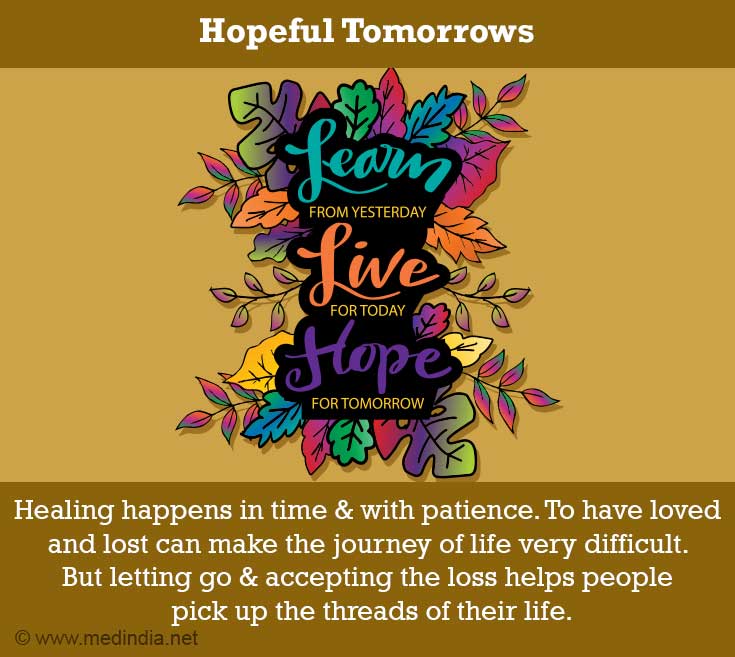
Bereavement Support Groups
There are many grief sharing support groups online. Some of them are listed below.
- Share grief following bereavement
- http://www.bereavementuk.co.uk/
- http://www.griefnet.org/
- Suicide survivors bereavement group
- http://www.foundation2.org/Content/Services/Support-Groups/Suicide-Survivors-Bereavement-Support-Group.aspx
- Bereavement support group for the loss of a child
- http://www.compassionatefriends.org/home.aspx
- http://www.agingcare.com/Message-Boards/116159/Support-group-for-death-of-an-adult-child.htm
- http://www.athealth.com/consumer/disorders/parentalgrief.html
- Bereavement support group for the loss of a parent
- http://www.hospicechesapeake.org/events-calender/view/669/142
- http://www.dailystrength.org/groups/adults-grieving-the-loss-of-a-parent
Bereavement during COVID-19 Pandemic
The outbreak of the COVID-19 pandemic has contributed to the endless amount of losses among the public. One of the unbearable losses includes that of loved ones.
People have lost their parents, spouses, children, friends, and many more. The outburst of or buried emotions breaks the survivors deep within. The unpredictable circumstances of the COVID-19 pandemic led to situations where people couldn’t be with their loved ones when they die or weren’t able to even mourn at someone’s death in a person with friends and family.
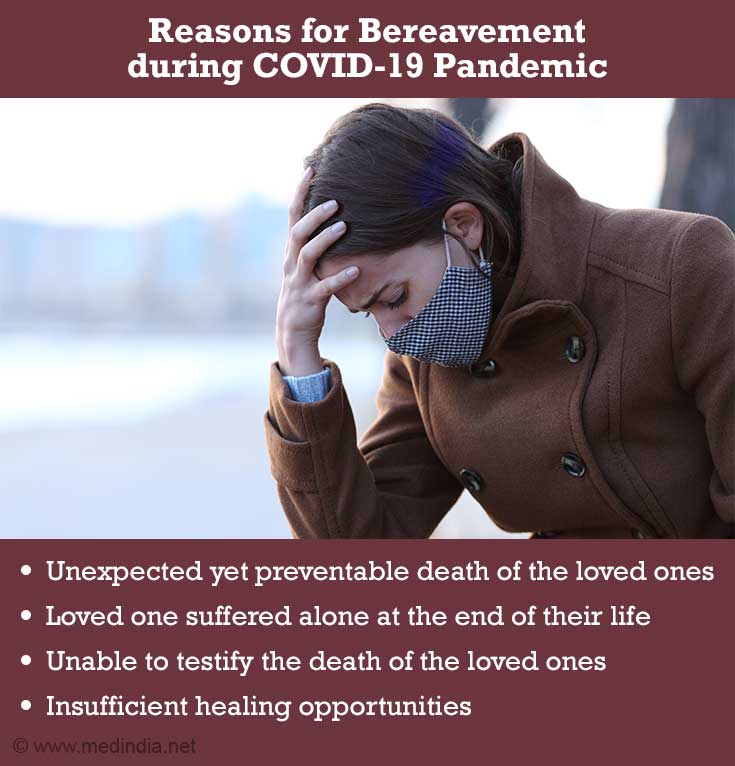
This can further worsen a person’s ability to adapt, heal, and recover. The heightened stress during this pandemic also generates crushing fear and anxiety. Certain COVID-19-related factors that may lengthen the grief period following bereavement during the pandemic are:
- The death of the loved one was unexpected and perhaps preventable
- Loved one suffered and died alone at the end of their life
- Unable to testify the death of the loved ones due to physical distancing
- Fear of contamination and isolation with insufficient healing opportunities (as one may not reach out normally)
- Financial worries and burden
Ways to Overcome Bereavement during this Pandemic
- It's crucial not to evade or suppress your feelings of grief. Everyone experiences the overwhelming pain that occurs due to the loss of a loved one at some point in life.
- Although one may find it extremely difficult to grieve normally in ways that we are used to, reaching out for ways to connect socially during the hard times of pandemic is vital.
- There were instances where some people had a virtual funeral or memorial service for a more meaningful connection.
- Having faith may have positive effects on mental health. It may help find purpose in life and hope after the loss.
- It might be extremely difficult to affirm the loss of a loved one as reality, but perceiving the loss as a universal experience might assist in gaining patience with them. There’s some loss to everyone in the hospital.
- Connecting to friends, family, or a “virtual” community through online platforms, and sharing the events of death may decrease the emotional load of grief.












